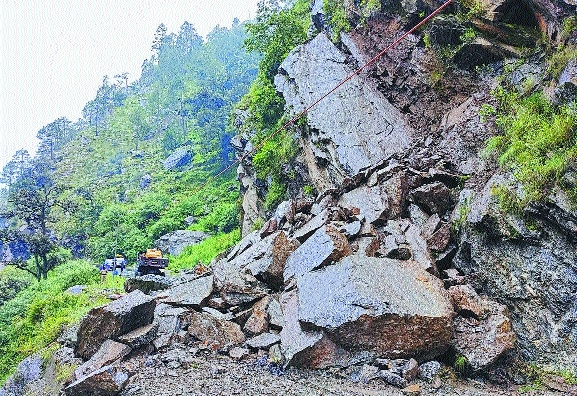Need to use the new EU initiative positively
| Date :04-Aug-2021 |

Mounds of landslide rubble triggered by heavy rainfall block Gangotri Highway, in Uttarkashi. (ANI file photo)
By D.T. Nandanpawar :
Uttarakhand is already bearing the worst brunt of environmental episodes in the form of floods and landslides, devastations of catastrophic proportions brought about by them, wild fires in the Americas and Australia.

The implications of the Carbon Border Adjustment Mechanism (CBAM) legislation by the European Union enacted recently has, both, positive as well as negative fall-outs for Indian industry as also the policy planners in the Government. This presents multifarious choices and also opportunities in equal measure to Indian industry and the Government, presenting new challenges to them in terms of technology options and upgradation to meet the targets for reduction in the levels of emissions of greenhouse gases to sustainable limits set under the Paris Agreement, agreed to and signed by over 150 nations. Under the European Union’s stringent legislative measure, as stipulated under the CABM, those industries adhering to emission of greenhouse gases targets will have greater export opportunities than those who fail to comply with the norms for reduction in the use of technologies prone to emission of carbon and are heavily dependent on fossil fuels responsible for raising the levels of greenhouse gasses. Thus persisting with old technologies which are substantially dependent on the use of fossil fuels, will make no business sense in not too distant of a future.
Indian industry, businesses and various Government agencies can ill-afford to ignore the message the European Union seeks to convey to the rest of the world that access to international markets will no longer be a cake-walk, nor a given and that it is seriously concerned about the consequences of global warming and to the well-being of humanity at large. This is one positive development post the Paris Agreement. That also is a message to the rest of the that are signatories to the Paris Agreement, willing to be serious partners in the fight against the impending disastrous impact of climate change, not only on human life but all of the living beings on planet Earth. Unfortunately, however, most of the world is still unwilling to acknowledge the unprecedented changes that have already taken place or are taking place at a stupendous speed in the weather patterns in several parts of the world and the disastrous fall-outs thereof. Several countries, including India, are currently witnessing unprecedented changes in weather cycles with dangerous consequences.
The melting, and receding of icebergs, rising temperatures, growing sea levels, the landslides on a regular basis in the fragile Himalayan eco system, its crippling effects on the populations in the Himalayan region are too fresh and too eloquent to be lost sight of or be brushed aside as normal happenings. Uttarakhand, the region nestling in the lap of the mighty Himalayas, is already bearing the worst brunt of environmental episodes in the form of floods and landslides, devastations of catastrophic proportions brought about by them, wild fires in the Americas and Australia. This European legislative measure is the only bright spot in the otherwise reluctant world to respond effectively and resolutely to the cause of environmental protection which they had pledged to be part of in the war against climate change, sharing technologies, earmarking substantial funds, act in a global cooperative mission, laying stress on research and development of technologies for combating and mitigating the adverse impact of climate change. Every signatory to the Paris Agreement realised that climate change was a global phenomenon and no single country would be in a position to contain its adverse effects on the human race. It was also acknowledged that climate change was a phenomenon that has been the consequence of human activity all around the world in the name of development and hence it was the responsibility of every member of the international community to take its share in mitigating the effects of global warming and protect and conserve the ecology of the planet Earth.
While some developed countries were not so enthusiastic over their commitment to the Paris Agreement for their own reasons, a majority of the signatory-nations pledged their wholehearted support to the global cause. In spite of this, the success or failure of the Paris Agreement largely depended on the developed countries’ unwavering support. However, there were a few elements that claimed to be the arbiters of human destiny and assumed global leadership, who were the ones to put a spoke in the Paris Agreement becoming the Magna Carta of fight against climate change. The villain of the piece was Mr. Donald Trump, the then President of the United States. With his refusal to be part of this global initiative, and his unwillingness to cooperate in any international effort to contain the disastrous effects of climate change, eventually withdrawing from the Agreement, he nearly put a jammer on the whole effort. That certainly has slowed down further progress. But the rest of international community was not willing to dump the Paris Agreement. Those who subscribed to Mr. Trump’s views were in a hopelessly poor minority. Even Mr. Trump’s own countrymen were not willing to buy his argument and they showed their preference to go with the rest of the world on climate change through the ballot box by voting decisively for Mr. Joe Biden, who laid much value to the international initiative on this critical problem confronting humanity, during the presidential poll. There is, however, no denying that there has been some slowing down in the progress in taking mitigating measures. But that was only a passing phase because the rest of the world was convinced that there was no escape from the global action to ward off the consequences of global warming.
It is this conviction that has led to a majority of the countries beginning to take mitigating measures stipulated under the Paris Agreement and gratifyingly the Indian Government has been the most active partner in spearheading the fight by taking several measures to contain the use of fossil fuels and laying stress on less polluting, renewable sources of energy as its commitment to the cause, though India is the least contributor to global warming, much less than the United States and China, by several notches. But the challenge is enormous and would require more vigorous and collective effort on an urgent basis, not only on governmental and institutional level but also on community level, where it should become a public movement, driven by the spirit ‘of the people, by the people and for the people.’ Besides, the local planning authority has to play a critical role in balancing the community’s development needs as well as addressing Nature’s conservation. Development cannot take place in isolation. It has to be compatible with conservation needs. And it is here that the urban planning authorities can author a critical role in playing a balancing act. - Author is a senior journalist associated with ‘The Hitavada’